Skills 2: Examining Social Cognitive Theory Factors and Their Impact
VerifiedAdded on 2023/06/18
|7
|1990
|131
Report
AI Summary
This report provides an analysis of social cognitive theory, focusing on its key factors: personal, environmental, and behavioral. It explores the components of the theory, such as self-efficacy, behavioral capability, and expectations. The impact of these factors is examined through various case studies, including Grand UK Holidays, Coach Tours Part 2, and others, highlighting how these factors influence each other and relate to change management. The report concludes that understanding social cognitive theory is crucial for analyzing individual behavior and adapting to environmental changes, emphasizing the importance of considering social perception and individual aspects for a comprehensive analysis.

Skills 2 (Skills for
Higher Education)
Higher Education)
Paraphrase This Document
Need a fresh take? Get an instant paraphrase of this document with our AI Paraphraser
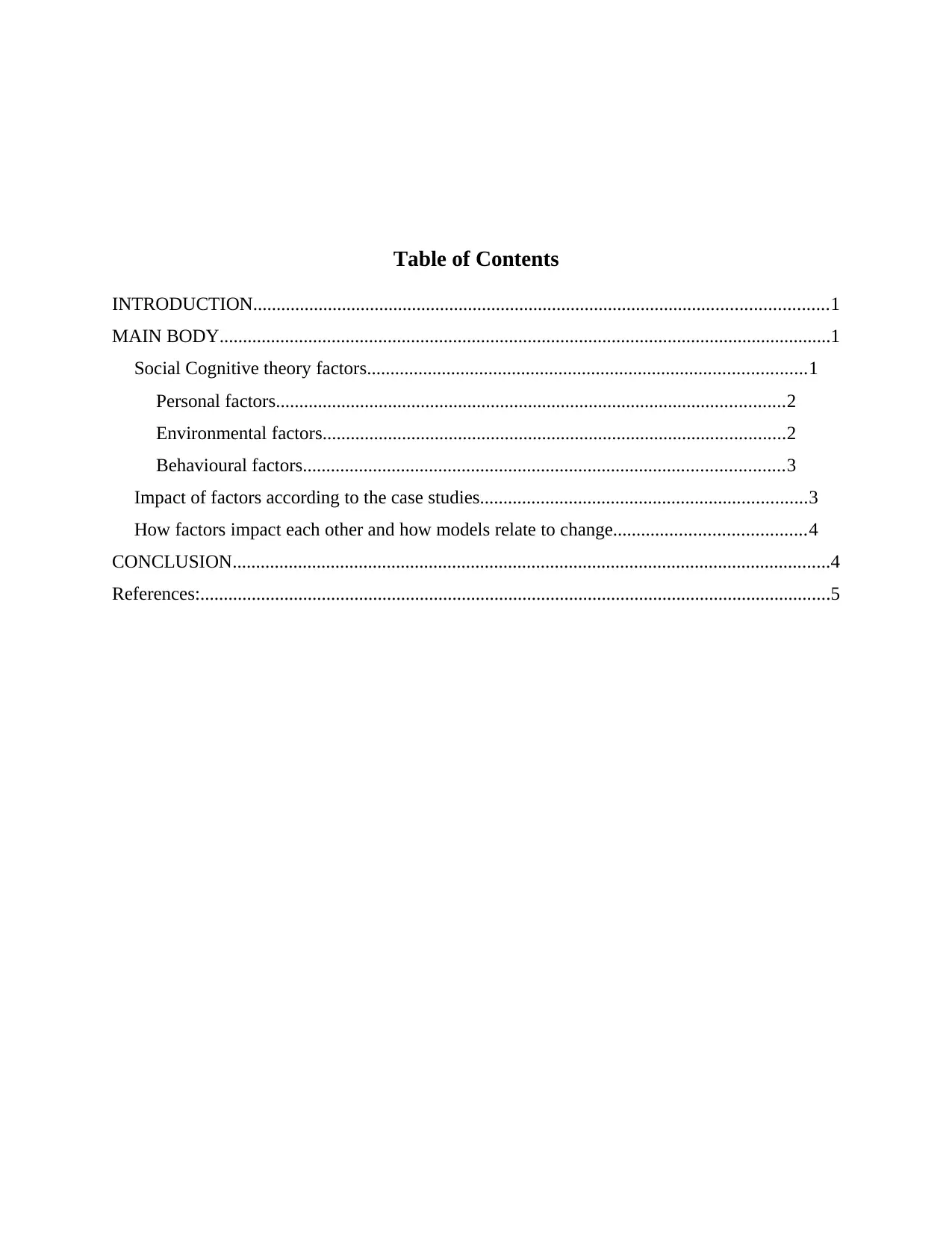
Table of Contents
INTRODUCTION...........................................................................................................................1
MAIN BODY...................................................................................................................................1
Social Cognitive theory factors..............................................................................................1
Personal factors.............................................................................................................2
Environmental factors...................................................................................................2
Behavioural factors.......................................................................................................3
Impact of factors according to the case studies......................................................................3
How factors impact each other and how models relate to change.........................................4
CONCLUSION................................................................................................................................4
References:.......................................................................................................................................5
INTRODUCTION...........................................................................................................................1
MAIN BODY...................................................................................................................................1
Social Cognitive theory factors..............................................................................................1
Personal factors.............................................................................................................2
Environmental factors...................................................................................................2
Behavioural factors.......................................................................................................3
Impact of factors according to the case studies......................................................................3
How factors impact each other and how models relate to change.........................................4
CONCLUSION................................................................................................................................4
References:.......................................................................................................................................5
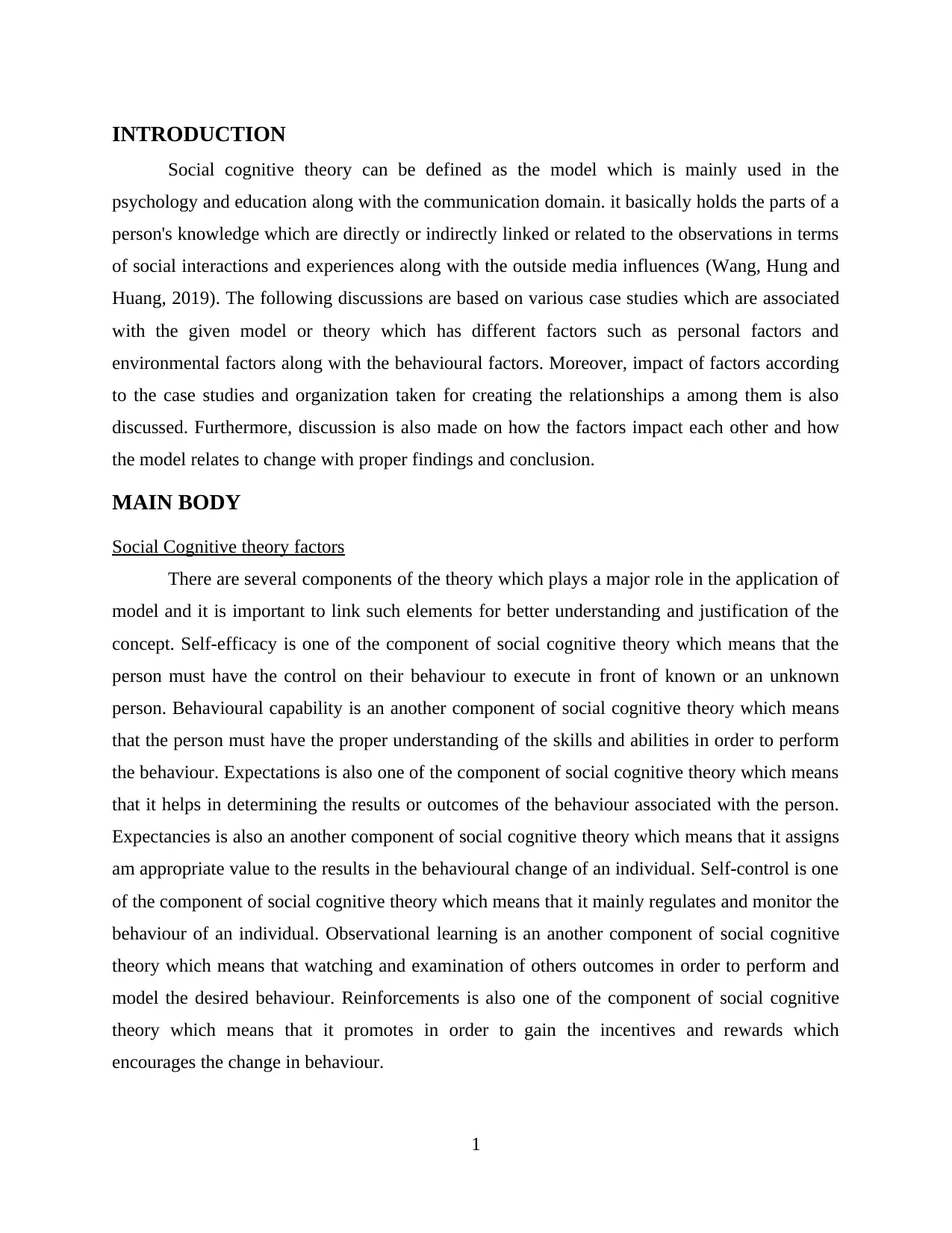
INTRODUCTION
Social cognitive theory can be defined as the model which is mainly used in the
psychology and education along with the communication domain. it basically holds the parts of a
person's knowledge which are directly or indirectly linked or related to the observations in terms
of social interactions and experiences along with the outside media influences (Wang, Hung and
Huang, 2019). The following discussions are based on various case studies which are associated
with the given model or theory which has different factors such as personal factors and
environmental factors along with the behavioural factors. Moreover, impact of factors according
to the case studies and organization taken for creating the relationships a among them is also
discussed. Furthermore, discussion is also made on how the factors impact each other and how
the model relates to change with proper findings and conclusion.
MAIN BODY
Social Cognitive theory factors
There are several components of the theory which plays a major role in the application of
model and it is important to link such elements for better understanding and justification of the
concept. Self-efficacy is one of the component of social cognitive theory which means that the
person must have the control on their behaviour to execute in front of known or an unknown
person. Behavioural capability is an another component of social cognitive theory which means
that the person must have the proper understanding of the skills and abilities in order to perform
the behaviour. Expectations is also one of the component of social cognitive theory which means
that it helps in determining the results or outcomes of the behaviour associated with the person.
Expectancies is also an another component of social cognitive theory which means that it assigns
am appropriate value to the results in the behavioural change of an individual. Self-control is one
of the component of social cognitive theory which means that it mainly regulates and monitor the
behaviour of an individual. Observational learning is an another component of social cognitive
theory which means that watching and examination of others outcomes in order to perform and
model the desired behaviour. Reinforcements is also one of the component of social cognitive
theory which means that it promotes in order to gain the incentives and rewards which
encourages the change in behaviour.
1
Social cognitive theory can be defined as the model which is mainly used in the
psychology and education along with the communication domain. it basically holds the parts of a
person's knowledge which are directly or indirectly linked or related to the observations in terms
of social interactions and experiences along with the outside media influences (Wang, Hung and
Huang, 2019). The following discussions are based on various case studies which are associated
with the given model or theory which has different factors such as personal factors and
environmental factors along with the behavioural factors. Moreover, impact of factors according
to the case studies and organization taken for creating the relationships a among them is also
discussed. Furthermore, discussion is also made on how the factors impact each other and how
the model relates to change with proper findings and conclusion.
MAIN BODY
Social Cognitive theory factors
There are several components of the theory which plays a major role in the application of
model and it is important to link such elements for better understanding and justification of the
concept. Self-efficacy is one of the component of social cognitive theory which means that the
person must have the control on their behaviour to execute in front of known or an unknown
person. Behavioural capability is an another component of social cognitive theory which means
that the person must have the proper understanding of the skills and abilities in order to perform
the behaviour. Expectations is also one of the component of social cognitive theory which means
that it helps in determining the results or outcomes of the behaviour associated with the person.
Expectancies is also an another component of social cognitive theory which means that it assigns
am appropriate value to the results in the behavioural change of an individual. Self-control is one
of the component of social cognitive theory which means that it mainly regulates and monitor the
behaviour of an individual. Observational learning is an another component of social cognitive
theory which means that watching and examination of others outcomes in order to perform and
model the desired behaviour. Reinforcements is also one of the component of social cognitive
theory which means that it promotes in order to gain the incentives and rewards which
encourages the change in behaviour.
1
⊘ This is a preview!⊘
Do you want full access?
Subscribe today to unlock all pages.

Trusted by 1+ million students worldwide
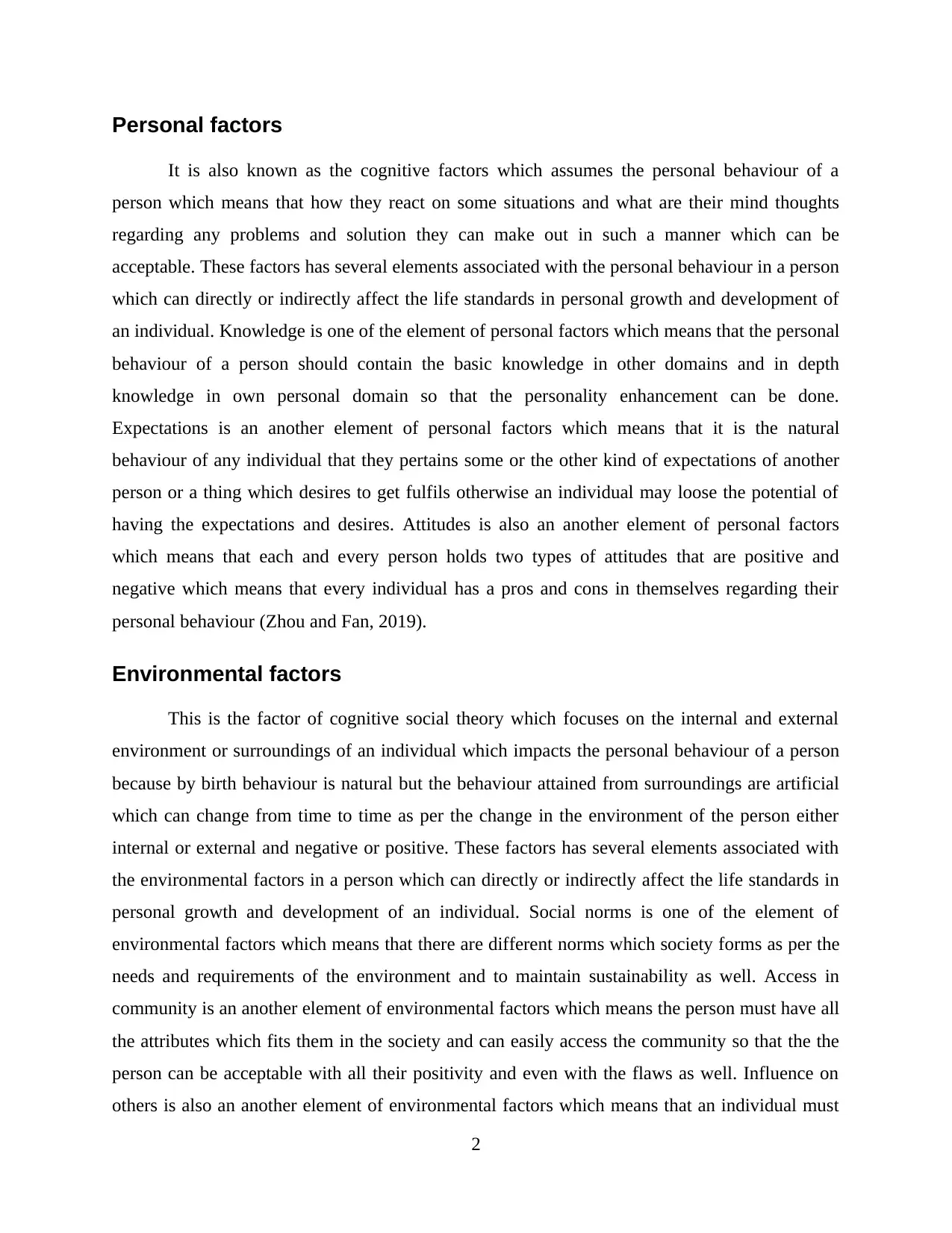
Personal factors
It is also known as the cognitive factors which assumes the personal behaviour of a
person which means that how they react on some situations and what are their mind thoughts
regarding any problems and solution they can make out in such a manner which can be
acceptable. These factors has several elements associated with the personal behaviour in a person
which can directly or indirectly affect the life standards in personal growth and development of
an individual. Knowledge is one of the element of personal factors which means that the personal
behaviour of a person should contain the basic knowledge in other domains and in depth
knowledge in own personal domain so that the personality enhancement can be done.
Expectations is an another element of personal factors which means that it is the natural
behaviour of any individual that they pertains some or the other kind of expectations of another
person or a thing which desires to get fulfils otherwise an individual may loose the potential of
having the expectations and desires. Attitudes is also an another element of personal factors
which means that each and every person holds two types of attitudes that are positive and
negative which means that every individual has a pros and cons in themselves regarding their
personal behaviour (Zhou and Fan, 2019).
Environmental factors
This is the factor of cognitive social theory which focuses on the internal and external
environment or surroundings of an individual which impacts the personal behaviour of a person
because by birth behaviour is natural but the behaviour attained from surroundings are artificial
which can change from time to time as per the change in the environment of the person either
internal or external and negative or positive. These factors has several elements associated with
the environmental factors in a person which can directly or indirectly affect the life standards in
personal growth and development of an individual. Social norms is one of the element of
environmental factors which means that there are different norms which society forms as per the
needs and requirements of the environment and to maintain sustainability as well. Access in
community is an another element of environmental factors which means the person must have all
the attributes which fits them in the society and can easily access the community so that the the
person can be acceptable with all their positivity and even with the flaws as well. Influence on
others is also an another element of environmental factors which means that an individual must
2
It is also known as the cognitive factors which assumes the personal behaviour of a
person which means that how they react on some situations and what are their mind thoughts
regarding any problems and solution they can make out in such a manner which can be
acceptable. These factors has several elements associated with the personal behaviour in a person
which can directly or indirectly affect the life standards in personal growth and development of
an individual. Knowledge is one of the element of personal factors which means that the personal
behaviour of a person should contain the basic knowledge in other domains and in depth
knowledge in own personal domain so that the personality enhancement can be done.
Expectations is an another element of personal factors which means that it is the natural
behaviour of any individual that they pertains some or the other kind of expectations of another
person or a thing which desires to get fulfils otherwise an individual may loose the potential of
having the expectations and desires. Attitudes is also an another element of personal factors
which means that each and every person holds two types of attitudes that are positive and
negative which means that every individual has a pros and cons in themselves regarding their
personal behaviour (Zhou and Fan, 2019).
Environmental factors
This is the factor of cognitive social theory which focuses on the internal and external
environment or surroundings of an individual which impacts the personal behaviour of a person
because by birth behaviour is natural but the behaviour attained from surroundings are artificial
which can change from time to time as per the change in the environment of the person either
internal or external and negative or positive. These factors has several elements associated with
the environmental factors in a person which can directly or indirectly affect the life standards in
personal growth and development of an individual. Social norms is one of the element of
environmental factors which means that there are different norms which society forms as per the
needs and requirements of the environment and to maintain sustainability as well. Access in
community is an another element of environmental factors which means the person must have all
the attributes which fits them in the society and can easily access the community so that the the
person can be acceptable with all their positivity and even with the flaws as well. Influence on
others is also an another element of environmental factors which means that an individual must
2
Paraphrase This Document
Need a fresh take? Get an instant paraphrase of this document with our AI Paraphraser
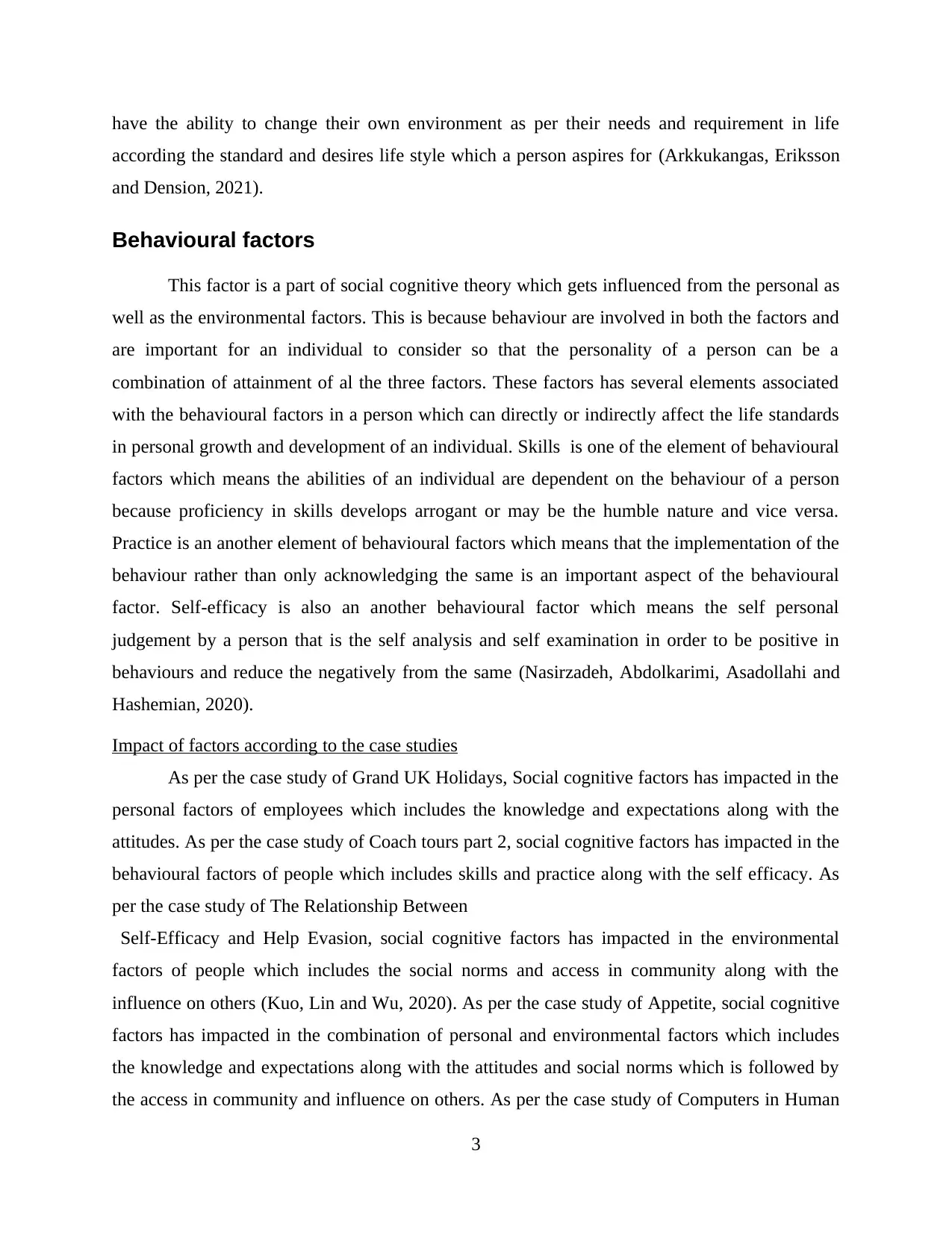
have the ability to change their own environment as per their needs and requirement in life
according the standard and desires life style which a person aspires for (Arkkukangas, Eriksson
and Dension, 2021).
Behavioural factors
This factor is a part of social cognitive theory which gets influenced from the personal as
well as the environmental factors. This is because behaviour are involved in both the factors and
are important for an individual to consider so that the personality of a person can be a
combination of attainment of al the three factors. These factors has several elements associated
with the behavioural factors in a person which can directly or indirectly affect the life standards
in personal growth and development of an individual. Skills is one of the element of behavioural
factors which means the abilities of an individual are dependent on the behaviour of a person
because proficiency in skills develops arrogant or may be the humble nature and vice versa.
Practice is an another element of behavioural factors which means that the implementation of the
behaviour rather than only acknowledging the same is an important aspect of the behavioural
factor. Self-efficacy is also an another behavioural factor which means the self personal
judgement by a person that is the self analysis and self examination in order to be positive in
behaviours and reduce the negatively from the same (Nasirzadeh, Abdolkarimi, Asadollahi and
Hashemian, 2020).
Impact of factors according to the case studies
As per the case study of Grand UK Holidays, Social cognitive factors has impacted in the
personal factors of employees which includes the knowledge and expectations along with the
attitudes. As per the case study of Coach tours part 2, social cognitive factors has impacted in the
behavioural factors of people which includes skills and practice along with the self efficacy. As
per the case study of The Relationship Between
Self-Efficacy and Help Evasion, social cognitive factors has impacted in the environmental
factors of people which includes the social norms and access in community along with the
influence on others (Kuo, Lin and Wu, 2020). As per the case study of Appetite, social cognitive
factors has impacted in the combination of personal and environmental factors which includes
the knowledge and expectations along with the attitudes and social norms which is followed by
the access in community and influence on others. As per the case study of Computers in Human
3
according the standard and desires life style which a person aspires for (Arkkukangas, Eriksson
and Dension, 2021).
Behavioural factors
This factor is a part of social cognitive theory which gets influenced from the personal as
well as the environmental factors. This is because behaviour are involved in both the factors and
are important for an individual to consider so that the personality of a person can be a
combination of attainment of al the three factors. These factors has several elements associated
with the behavioural factors in a person which can directly or indirectly affect the life standards
in personal growth and development of an individual. Skills is one of the element of behavioural
factors which means the abilities of an individual are dependent on the behaviour of a person
because proficiency in skills develops arrogant or may be the humble nature and vice versa.
Practice is an another element of behavioural factors which means that the implementation of the
behaviour rather than only acknowledging the same is an important aspect of the behavioural
factor. Self-efficacy is also an another behavioural factor which means the self personal
judgement by a person that is the self analysis and self examination in order to be positive in
behaviours and reduce the negatively from the same (Nasirzadeh, Abdolkarimi, Asadollahi and
Hashemian, 2020).
Impact of factors according to the case studies
As per the case study of Grand UK Holidays, Social cognitive factors has impacted in the
personal factors of employees which includes the knowledge and expectations along with the
attitudes. As per the case study of Coach tours part 2, social cognitive factors has impacted in the
behavioural factors of people which includes skills and practice along with the self efficacy. As
per the case study of The Relationship Between
Self-Efficacy and Help Evasion, social cognitive factors has impacted in the environmental
factors of people which includes the social norms and access in community along with the
influence on others (Kuo, Lin and Wu, 2020). As per the case study of Appetite, social cognitive
factors has impacted in the combination of personal and environmental factors which includes
the knowledge and expectations along with the attitudes and social norms which is followed by
the access in community and influence on others. As per the case study of Computers in Human
3
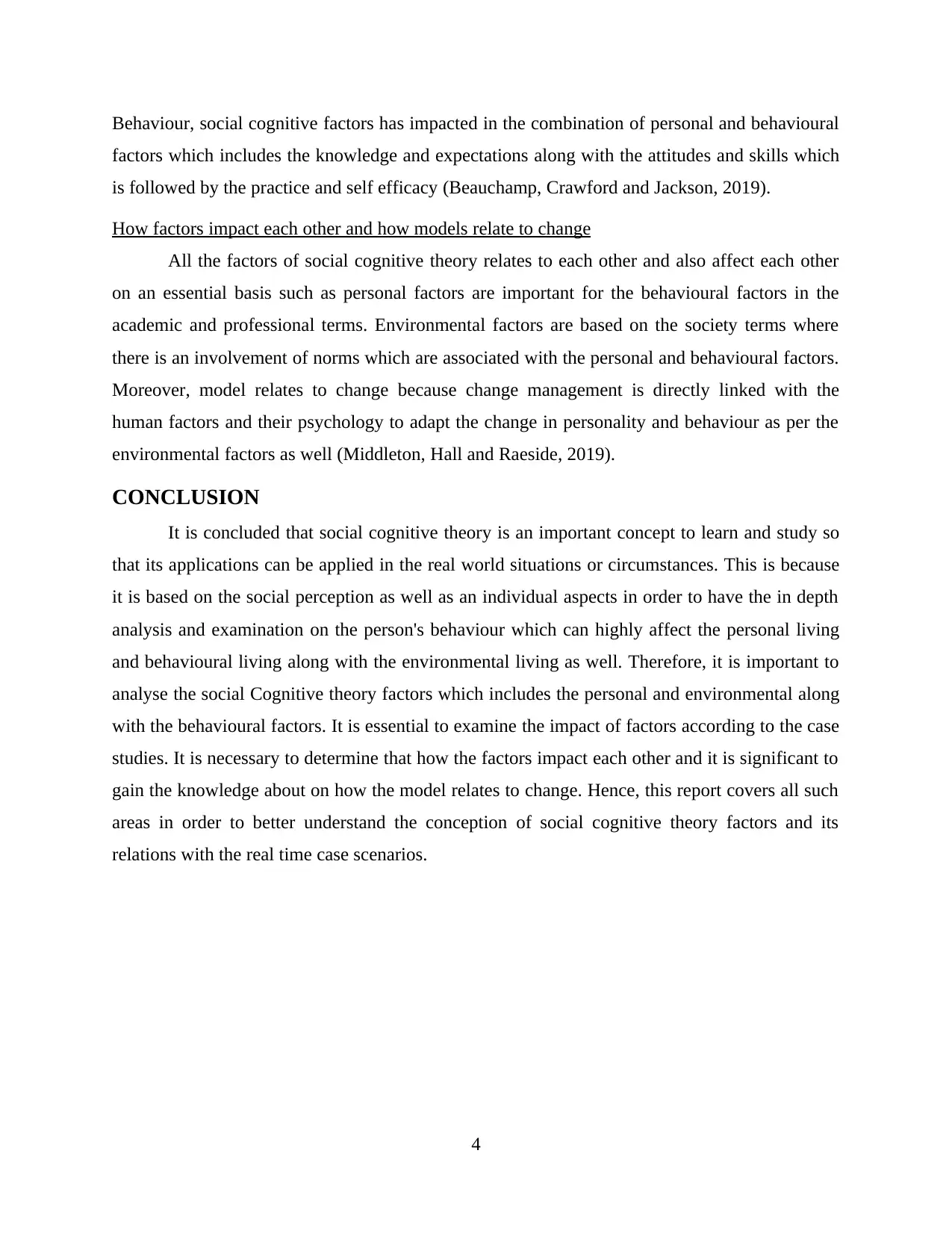
Behaviour, social cognitive factors has impacted in the combination of personal and behavioural
factors which includes the knowledge and expectations along with the attitudes and skills which
is followed by the practice and self efficacy (Beauchamp, Crawford and Jackson, 2019).
How factors impact each other and how models relate to change
All the factors of social cognitive theory relates to each other and also affect each other
on an essential basis such as personal factors are important for the behavioural factors in the
academic and professional terms. Environmental factors are based on the society terms where
there is an involvement of norms which are associated with the personal and behavioural factors.
Moreover, model relates to change because change management is directly linked with the
human factors and their psychology to adapt the change in personality and behaviour as per the
environmental factors as well (Middleton, Hall and Raeside, 2019).
CONCLUSION
It is concluded that social cognitive theory is an important concept to learn and study so
that its applications can be applied in the real world situations or circumstances. This is because
it is based on the social perception as well as an individual aspects in order to have the in depth
analysis and examination on the person's behaviour which can highly affect the personal living
and behavioural living along with the environmental living as well. Therefore, it is important to
analyse the social Cognitive theory factors which includes the personal and environmental along
with the behavioural factors. It is essential to examine the impact of factors according to the case
studies. It is necessary to determine that how the factors impact each other and it is significant to
gain the knowledge about on how the model relates to change. Hence, this report covers all such
areas in order to better understand the conception of social cognitive theory factors and its
relations with the real time case scenarios.
4
factors which includes the knowledge and expectations along with the attitudes and skills which
is followed by the practice and self efficacy (Beauchamp, Crawford and Jackson, 2019).
How factors impact each other and how models relate to change
All the factors of social cognitive theory relates to each other and also affect each other
on an essential basis such as personal factors are important for the behavioural factors in the
academic and professional terms. Environmental factors are based on the society terms where
there is an involvement of norms which are associated with the personal and behavioural factors.
Moreover, model relates to change because change management is directly linked with the
human factors and their psychology to adapt the change in personality and behaviour as per the
environmental factors as well (Middleton, Hall and Raeside, 2019).
CONCLUSION
It is concluded that social cognitive theory is an important concept to learn and study so
that its applications can be applied in the real world situations or circumstances. This is because
it is based on the social perception as well as an individual aspects in order to have the in depth
analysis and examination on the person's behaviour which can highly affect the personal living
and behavioural living along with the environmental living as well. Therefore, it is important to
analyse the social Cognitive theory factors which includes the personal and environmental along
with the behavioural factors. It is essential to examine the impact of factors according to the case
studies. It is necessary to determine that how the factors impact each other and it is significant to
gain the knowledge about on how the model relates to change. Hence, this report covers all such
areas in order to better understand the conception of social cognitive theory factors and its
relations with the real time case scenarios.
4
⊘ This is a preview!⊘
Do you want full access?
Subscribe today to unlock all pages.

Trusted by 1+ million students worldwide
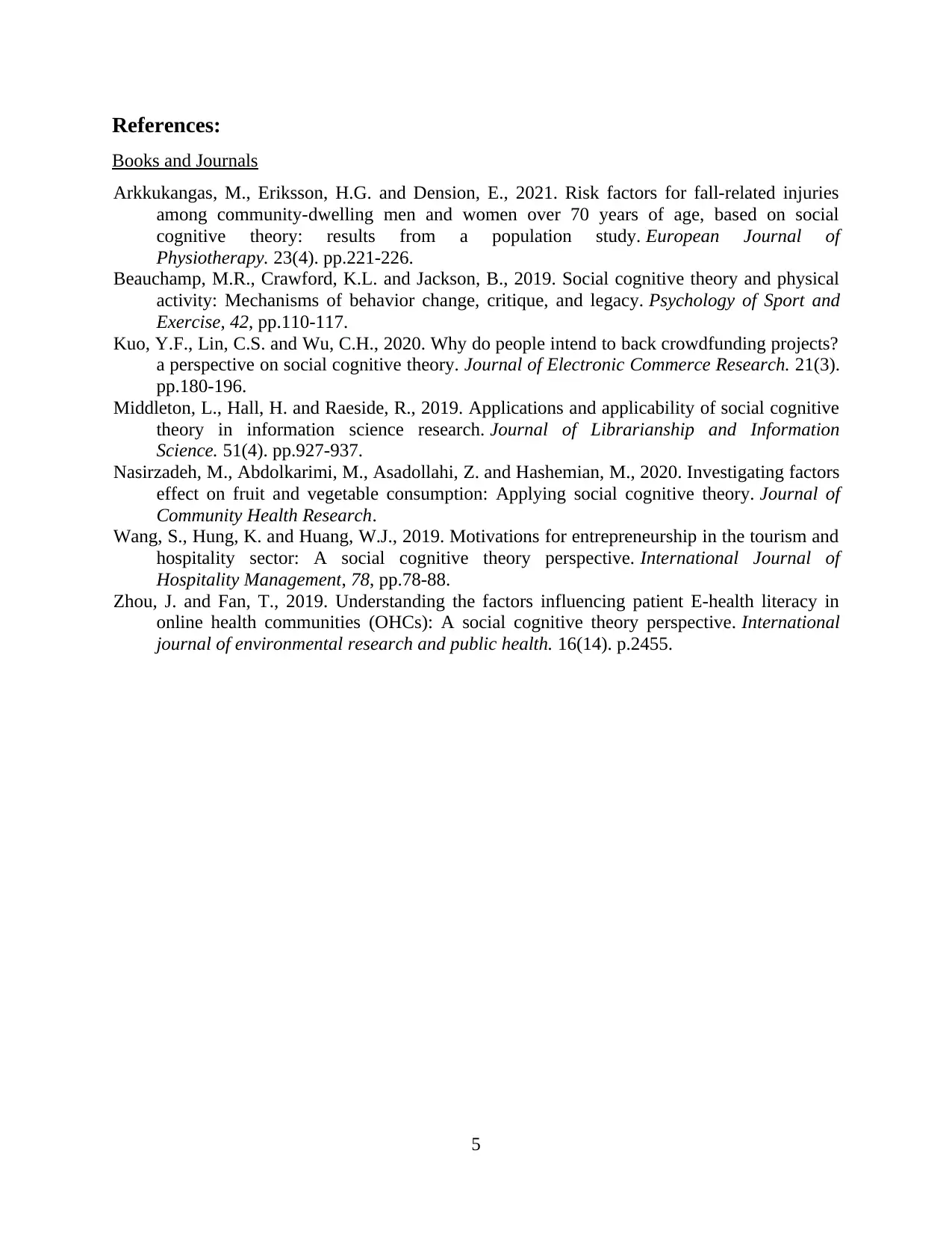
References:
Books and Journals
Arkkukangas, M., Eriksson, H.G. and Dension, E., 2021. Risk factors for fall-related injuries
among community-dwelling men and women over 70 years of age, based on social
cognitive theory: results from a population study. European Journal of
Physiotherapy. 23(4). pp.221-226.
Beauchamp, M.R., Crawford, K.L. and Jackson, B., 2019. Social cognitive theory and physical
activity: Mechanisms of behavior change, critique, and legacy. Psychology of Sport and
Exercise, 42, pp.110-117.
Kuo, Y.F., Lin, C.S. and Wu, C.H., 2020. Why do people intend to back crowdfunding projects?
a perspective on social cognitive theory. Journal of Electronic Commerce Research. 21(3).
pp.180-196.
Middleton, L., Hall, H. and Raeside, R., 2019. Applications and applicability of social cognitive
theory in information science research. Journal of Librarianship and Information
Science. 51(4). pp.927-937.
Nasirzadeh, M., Abdolkarimi, M., Asadollahi, Z. and Hashemian, M., 2020. Investigating factors
effect on fruit and vegetable consumption: Applying social cognitive theory. Journal of
Community Health Research.
Wang, S., Hung, K. and Huang, W.J., 2019. Motivations for entrepreneurship in the tourism and
hospitality sector: A social cognitive theory perspective. International Journal of
Hospitality Management, 78, pp.78-88.
Zhou, J. and Fan, T., 2019. Understanding the factors influencing patient E-health literacy in
online health communities (OHCs): A social cognitive theory perspective. International
journal of environmental research and public health. 16(14). p.2455.
5
Books and Journals
Arkkukangas, M., Eriksson, H.G. and Dension, E., 2021. Risk factors for fall-related injuries
among community-dwelling men and women over 70 years of age, based on social
cognitive theory: results from a population study. European Journal of
Physiotherapy. 23(4). pp.221-226.
Beauchamp, M.R., Crawford, K.L. and Jackson, B., 2019. Social cognitive theory and physical
activity: Mechanisms of behavior change, critique, and legacy. Psychology of Sport and
Exercise, 42, pp.110-117.
Kuo, Y.F., Lin, C.S. and Wu, C.H., 2020. Why do people intend to back crowdfunding projects?
a perspective on social cognitive theory. Journal of Electronic Commerce Research. 21(3).
pp.180-196.
Middleton, L., Hall, H. and Raeside, R., 2019. Applications and applicability of social cognitive
theory in information science research. Journal of Librarianship and Information
Science. 51(4). pp.927-937.
Nasirzadeh, M., Abdolkarimi, M., Asadollahi, Z. and Hashemian, M., 2020. Investigating factors
effect on fruit and vegetable consumption: Applying social cognitive theory. Journal of
Community Health Research.
Wang, S., Hung, K. and Huang, W.J., 2019. Motivations for entrepreneurship in the tourism and
hospitality sector: A social cognitive theory perspective. International Journal of
Hospitality Management, 78, pp.78-88.
Zhou, J. and Fan, T., 2019. Understanding the factors influencing patient E-health literacy in
online health communities (OHCs): A social cognitive theory perspective. International
journal of environmental research and public health. 16(14). p.2455.
5
1 out of 7
Related Documents
Your All-in-One AI-Powered Toolkit for Academic Success.
+13062052269
info@desklib.com
Available 24*7 on WhatsApp / Email
![[object Object]](/_next/static/media/star-bottom.7253800d.svg)
Unlock your academic potential
Copyright © 2020–2025 A2Z Services. All Rights Reserved. Developed and managed by ZUCOL.




